|
|
|
Sort Order |
|
|
|
Items / Page
|
|
|
|
|
|
|
| Srl | Item |
| 1 |
ID:
138784
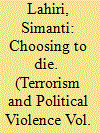

|
|
|
|
|
| Summary/Abstract |
Scholars tend to attribute the use of suicide protest and suicide bombing to purely rational considerations. In contrast, I argue that conventional understandings of strategy are too narrow and must be expanded to include emotional motivations for political mobilization. “Complex” strategy directly engages both the calculative and emotive understandings of political action. I develop this theory through a comparison of suicide protests and suicide bombings in South Asia, focusing on the emotional content of this extreme tactic. Suicide protests illustrate the importance of pride, sympathy, fear, and shame in political mobilization. I explore the emotional character of suicide in protest through an investigation of two cases: the Liberation Tigers of Tamil Eelam in Sri Lanka (LTTE) and the Narmada Bachao Andolan (NBA) in India.
|
|
|
|
|
|
|
|
|
|
|
|
|
|
|
|
| 2 |
ID:
138783
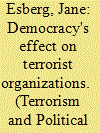

|
|
|
|
|
| Summary/Abstract |
How does democracy influence terrorism? The regime-responsive school argues that lack of representation in autocracies motivates violence; the regime-permissive school posits that individual liberty in democracies allows it. The schools thus disagree about the democratic feature to which violence responds—representation or individual liberty. These arguments are problematic in two ways. First, neither accounts for the potentially competing effects of different democratic features. Second, treating terrorism as a set response to operating context ignores the operational processes behind violence, described in organizational theories of terrorism. This article develops a bridge between the regime-responsive and regime-permissive schools by applying organizational theories of terrorism to their key arguments. I argue that representation and individual liberty have independent, and sometimes competing, effects on armed groups' missions, hierarchies, and membership—collectively organizational capacity, the ability to survive and influence the environment. This explains the mixed effects of democracy on terrorism: both high-functioning democracy and repressive autocracy weaken organizational capacity, but decreased representation in a democracy or higher individual liberty in an autocracy removes organizational stresses. New research on Chile between 1965 and 1995—representing five government periods, with four armed groups operating—acts as an initial test of these relationships.
|
|
|
|
|
|
|
|
|
|
|
|
|
|
|
|
| 3 |
ID:
138781
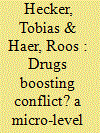

|
|
|
|
|
| Summary/Abstract |
Many studies have emphasized the role of natural resources in the onset and duration of armed conflict. Due to its characteristics, narcotics are considered to be one of the most influential resources. However, the dynamics of how this particular commodity is linked to conflict is still not well understood. Most scholars have focused on the revenue aspects of narcotics and only a few have mentioned the micro-level aspect, i.e., the effect of drug intake and alcohol consumption on combatants' behavior during conflict. With the help of a dataset based on 224 interviews held with former combatants in the Democratic Republic of the Congo, we examined this latter dynamic. Our analyses show, after controlling for armed group-level and individual-level variables, that drug intake and alcohol consumption boost the number of violent actions perpetrated by combatants.
|
|
|
|
|
|
|
|
|
|
|
|
|
|
|
|
| 4 |
ID:
138787
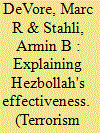

|
|
|
| 5 |
ID:
138786
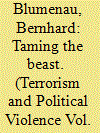

|
|
|
|
|
| Summary/Abstract |
In the 1970s, Western European countries were hit hard by terrorism, especially by international terrorism that crossed borders easily and allowed terrorists of different origins to carry out attacks against both governments and people. Consequently, the necessity of fighting this menace also extended to international organisations. This article looks at how the Council of Europe dealt with the issue, and assesses the negotiations that led to the Convention on the Suppression of Terrorism from the German perspective. West Germany was very interested in establishing a sounder international legal framework against terrorism and thought that the Council of Europe would be able to make an important contribution by abolishing the political offence exception that had so far been a core feature of most extradition treaties. This clause allowed political criminals to escape punishment by fleeing to a country that would deny extradition to a different country on the grounds of the political nature of the act committed by the person in question. The article gives an account and analysis of the complex negotiations that finally resulted in the adoption of the Convention in 1977, as well as of the problems encountered and compromises reached during these negotiations.
|
|
|
|
|
|
|
|
|
|
|
|
|
|
|
|
| 6 |
ID:
138785


|
|
|
|
|
| Summary/Abstract |
Authoritarian regimes use repression as an essential strategy to attain regime stability and survival. During the Arab Spring, different forms of repression have been employed. We argue that to explain this variation, three bundles of characteristics have to be taken into account: the setup of the regime, the state, and the challenge. As we assume that elites have a wider repertoire of strategies besides repression at their disposal, the analysis of repression has to be embedded in a broader framework of strategies of rule. Including specific forms and target groups of repression, we develop an explanatory model addressing the question of which repressive measures rulers utilize under which circumstances. The postulated relationship between repression and characteristics of the state, regime, and challenge are then tested in a comparative analysis of the reactions to the challenges arising with the 2011 uprisings in two very different Arab countries, Bahrain and Egypt. On the basis of these empirical findings, we propose a readjusted model explaining repression.
|
|
|
|
|
|
|
|
|
|
|
|
|
|
|
|
| 7 |
ID:
138782


|
|
|
|
|
| Summary/Abstract |
Researchers increasingly conduct quantitative studies of terrorist groups, which is an important advance in the literature. However, there has been little discussion of what constitutes a “terrorist group,” regarding conceptualization or measurement. Many studies of terrorist groups do not define the term, and among those that do, definitions vary considerably. The lack of clarity leads to conceptual confusion as well as sample selection issues, which can affect inferences. To address these issues, this article offers an in-depth analysis of the term and its use. It explores definitions in the literature, and then discusses different samples used. Empirically, the article demonstrates how sample selection can affect variable values. It also shows that a non-representative sample, such as the U.S. Foreign Terrorist Organization list, can lead to inaccurate generalizations. Ultimately, I present a straightforward “inclusive” definition, and argue for its practicality. Other suggestions are made for a more effective and cohesive research program.
|
|
|
|
|
|
|
|
|
|
|
|
|
|
|
|
|
|
|
|
|